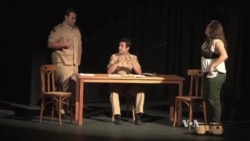State censorship has long played a role in guiding the arts in Lebanon, where a permissive culture and a delicate sectarian balance come head to head.
In the face of what they complain are arbitrary clampdowns, though, some activists and playwrights are taking the fight for free speech to the courts.
MARCH is a civil rights organization that works with playwrights whose scripts, it says, failed to make it through government’s required approval process.
Using content from articles, blog posts and TV shows already online and uncensored, it submitted four plays that tackled some of the most taboo topics in Lebanon: politics, the country’s civil war, Zionism, religion and homosexuality.
Lea Baroudi, co-founder of MARCH, said the plays never made it past the censors. Now the group is launching a court appeal, and is campaigning to ensure that any decisions to ban or censor content are formalized.
“A lot of people think there is no censorship in Lebanon, or that the laws are pretty correct,” she said. “What we wanted to show and prove is that the laws on censorship are completely arbitrary. All they do is oppress arts and culture in Lebanon, as the only people who suffer are the artists and play directors.
"The censorship is not even efficient, as the content we used could be found elsewhere. So if you are trying to protect communities, it is not working,” said Baroudi.
Danger of offending
The deadly attack on staff at French satirical magazine Charlie Hebdo, thought to have been a response to depictions of the Prophet Muhammad, sparked widespread debate about the limits of free speech.
In Lebanon, more than a hundred gathered in central Beirut's Samir Kassir square - named after a Lebanese journalist killed by a car bomb in 2005 - in an act of solidarity and support for free speech.
However, others defend the role of censorship, insisting that free speech can go too far, given Lebanon's sectarian diversity and, especially, at a time of regional upheaval.
Baroudi argued the very concept of censorship, however, is often a misplaced one. “Art is very cathartic and in our point of view this strategy of making everything taboo in order to please and appease every group and community is not making things better. It’s making them worse and it’s building up the tensions.”
The government’s general security department, which had not responded to a request for comment on the issue, is one of those tasked with handling censorship. It has previously said it simply follows the current laws when it comes to censorship.
But MARCH insisted these laws are both unclear and outdated in their application.
The group said that the general security department is now insisting it did not ask for a ban to be imposed but requested that certain parts of the plays be modified instead. MARCH claims that decisions over censorship are often imposed verbally rather than in writing to make them harder to counter. It further insisted that the ban remains in place and adds that such confusion highlights the need to formalize the process.
Lawyer Diane Assaf is handling the appeal for MARCH. She asserted that the censorship laws, some of which are more than half a century old, need to be reformed.
“The red lines of what you can say, or what you cannot say, or what you can do or what you cannot do, are extremely vague,” she said. “They give a very large margin for general security to over-interpret.”
Following the law
The legal justifications for banning or censoring material include if it "is offensive to the sensitivities of the public", "exposes the state to danger", "is propaganda against state interests" or is "disrespectful to public order, morals and good ethics."
The result is that a variety of international works have fallen victim to the censors. This includes such classics as John Steinbeck’s Of Mice and MenI, popular, mainstream novels like Dan Brown’s The Da Vinci Code, and music from artists as diverse as Lady Gaga and Frank Sinatra.
Firas Talhouk, a researcher on the topic for the Lebanese organization SKeyes Media, said the laws often are interpreted according to the politics of the day. “It really fluctuates. It depends on the political and security situation in Lebanon and the region,” he said. “It also depends on the political players and the personalities of those in charge.”
What's more, the pressure of censorship goes beyond the government. “There are certain political figures that you cannot talk about but it’s not only because of censorship. It is also out of social and self-censorship,” he added.
Self-censorship
Writer and director Lucien Bourjeily affirms that artists now self-censor their work to make sure it gets approval from the government.
Bourjeily wrote Will It Pass or Not, a theatrical study of the censorship process.
The censors banned it.
For Bourjeily, the state really has an impact in the minds of artists themselves. “It is there. It is present. For many starting artists they feel it, but once you become established in one way or another because you start to understand the system, you might get used to it, and that’s the problem."
"Once you get used to censorship, sometimes you self-censor," he said. "That’s how the title of the play came to be, will it pass or won’t it, because it’s a question that every writer asks.”
In spite of the challenges, Lebanon’s artistic community promises it will continue to create and to push the boundaries of what is taboo.
“Art is where we make a stand,” said Bourjeily. “If we don’t make it there, freedom of expression is lost for everyone - for artists, for journalists and for everyday people.”












